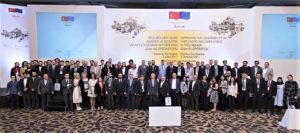
Technical Assistance for Implementation of Civil Society Dialogue and Civil Society Support Programmes (TR2015/DG/01/A5-01/001)
The overall aim of the project is to increase bilateral exchanges and cooperation between CSOs in Turkey and the EU at local, regional and national levels, to promote awareness raising initiatives on importance and benefits of membership of Turkey to the EU within Turkey and EU and on

Technical Assistance for Facilitating Access of Disadvantaged Higher Education Students to the Labour Market
Research indicated that disadvantaged people, especially poor students, lack in participation in the labour market. Consequently, the purpose of the project was to increase the employability of disadvantaged people, facilitate their access to the labour market, and increase their access to public employment services. Helping disadvantaged people gain

Technical Assistance for Improving the Quality of Public Employment Services
Quality of public employment services depends on the methods of attempting to attract and retain more people in employment. Thus, the operation aimed to create a capacity building and institutional development by enhancing the capacities of the Beneficiary and stakeholders to improve the public employment services that are

Technical Assistance for Improving the Adaptability of Employers and Employees in TR33
Qualified individuals mean a powerful region and a powerful region requires investing in human resources. Hence, this assignment aimed to encourage employers and employees of SMEs in the TR33 Region (Kütahya, Afyonkarahisar, Manisa, and Uşak provinces), particularly by promoting lifelong learning. More specifically, the project’s purpose was to

Improvement of Legislation, Control and Awareness in Food Safety, Animal Health and Welfare in Ukraine
The project aims to support the implementation of the Association Agreement’s provisions between the EU and Ukraine concerning food safety, animal health, and welfare.

Technical Assistance for Promoting Women’s Employment in Turkey
The employability of women has been a challenging issue in Turkey for decades. The labour market of women needs to be improved in terms of the existing capacity to design, develop and implement policies to attract and retain more people in employment, particularly by increasing the participation of

